




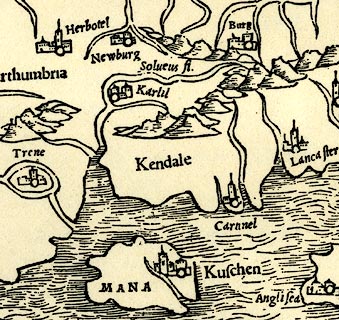 click to enlarge
click to enlargePTY4Cm.jpg
hillocks; mountains, but no lakes
item:- private collection : 131
Image © see bottom of page
""Take care, Lizzy; that speech savours strongly of disappointment.""
"Before they were separated by the conclusion of the play, she had the unexpected happiness of an invitation to accompany her uncle and aunt in a tour of pleasure which they proposed taking in the summer."
""We have not determined how far it shall carry us," said Mrs. Gardiner, "but perhaps to the Lakes.""
"No scheme could have been more agreeable to Elizabeth, and her acceptance of the invitation was most ready and grateful. "My dear, dear aunt," she rapturously cried, "what delight! what felicity! You give me fresh life and vigour. Adieu to disappointment and spleen. What are young men to rocks and mountains? Oh! what hours of transport we shall spend! And when we do return, it shall not be like other travellers, without being able to give one accurate idea of anything. We will know where we have gone-we will recollect what we have seen. Lakes, mountains, and rivers, shall not be jumbled together in our imaginations; nor when we attempt to describe any particular scene, will we begin quarreling about its relative situation. Let our first effusions be less insupportable than those of the generality of travellers.""
Later, Elizabeth looks forward to her trip to the Lakes. "Her tour to the Lakes was now the object of her happiest thoughts; it was her best consolation for all the uncomfortable hours which the discontentedness of her mother and Kitty made inevitable; and could she have included Jane in the scheme, every part of it would have been perfect."
Mr. Gardiner's business schedule later prevents their travel taking them as far north as the Lakes, to Elizabeth's great disappointment. "The time fixed for the beginning of their northern tour was now fast approaching, and a fortnight only was wanting of it, when a letter arrived from Mrs. Gardiner, which at once delayed its commencement and curtailed its extent. Mr. Gardiner would be prevented by business from setting out till a fortnight later in July, and must be in London again within a month, and as that left too short a period for them to go so far, and see so much as they had proposed, or at least to see it with the leisure and comfort they had built on, they were obliged to give up the Lakes, and substitute a more contracted tour; and, according to the present plan, were to go no farther northwards than Derbyshire. In that county there was enough to be seen to occupy the chief of their three weeks; and to Mrs. Gardiner it had a peculiarly strong attraction. The town where she had formerly passed some years of her life, and where they were now to spend a few days, was probably as great an object of her curiosity as all the celebrated beauties of Matlock, Chatsworth, Dovedale, or the Peak."
"Elizabeth was excessively disappointed; she had set her heart on seeing the Lakes, and still thought there might have been time enough. But it was her business to be satisfied--and certainly her temper to be happy; and all was soon right again."
 goto source
goto sourceGentleman's Magazine 1868 part 1 p.639 "THE ENGLISH TRAVELLER."
"ONE of the most marked features in these times of progress is the persistence with which English people take their annual holiday. We are not now speaking of the professed traveller, who, discarding civilisation and beaten tracks, flings himself into the wilds of unknown prairies and primaeval forests, as if the one object of his life was to carve out a way hitherto unknown to the Geographical Society, but rather of the great mass of easy-going middle-class folk, who, as the summer draws near, expreience a feeling of restlessness, only to be mitigated by Alpine climbs and canoe voyages, or the less exciting but safer visits to Scotland or the Lakes. There is no country in which this peculiar longing is so periodic, or so habitually satisfied, as it is in England. Perhaps, of all others, Russia sends the most polished, and America the greatest number of travellers; but these, albeit met with in most places, are the very salt of their class, bent either on pleasure or with some political object. In France, too, the Baths of Bigorre and Biarritz attract great numbers; but these are nearly all fashionables who go to avoid the heat of Paris, and because it is en regle. None of these countries have anything to compare with that great Hegira which the English summer and autumn call forth; nor does there seem to be that love of travel, for travel's sake, which is so innate in the Anglo-Saxon. One reason is, that in England we work hard for our livelihood and our amusement. Whether we are statesmen, merchants, or professional men, we stick to our last for nine months in the year at the least, before we consider that we have earned the right to our holiday; and when we do take it, we take it with the same desperate earnestness with which we have worked for it."
"With most Englishmen of the present day, a holiday is relaxation, but not repose - relaxation simply of the head and mind, which have been for many months at high pressure and which require the remedy of stimulant - the stimulant of change and active exertion. What the Sunday walk is to the bleached, asphixiated weaver, the annual holiday is to the over-worked middle-class man, who gains in a short time more benefit from his outing than he would from a year's dosing with quinine and iron. To the mind the restorative action is still greater, and were it not for this opportunity of discarding for a time all worry and anxiety, by becoming as it were dead to business, many a"
item:- guide book; Murray's guides
 goto source
goto sourceGentleman's Magazine 1868 part 1 p.640 "father of a family would soon be a candidate for the lunatic asylum. Happy is the man who has the determination and the power of leaving no address behind him, so that letters, and what are still worse, telegrams, cannot be sent after him to poison his pleasure and disturb his mental recovery; though in the complicated relations of the present day, very few can afford thus to isolate themselves for a whole month. Some day a future Macaulay will point out the extraordinary effect that this travelling habit has had, not only upon our domestic matters, but upon society at large: and the work has yet to be written which treats on this particular phase of English locomotion. The present generation has little conception of the changes that have taken place since the day when the mail-coach was the only medium of communication between town and country. To the bulk of quiet villages, the arrival of a Londoner was a thing to talk about, while few members of a family ever looked upon the metropolis as a place of resort, except for a state visit once or twice in their lives. But now London is identical with the country, as far as the intercourse of society and public opinion go; and, au contraire, the country is too often London. The great cause of this change is the facility of locomotion, which, like the effects of the penny postage on correspondence, has induced people to leave their homes so much, that it has now become a confirmed habit. ... But, even with improved roads and excellent coaching, the Englishman, except when bent upon business, was a fixture at home; and it was not until after the full development of the railway system, that the excursionist became a person of importance, and a class to be conciliated. With the excursionist came the guide-book; but whether the former was instrumental in the appearance of the latter, or whether improved guide-books helped to create the excursionist, is immaterial; no doubt the one influenced the other."
"There is the same difference between the handbook of the present day and the old post-chaise companion, as there is between an express train and the carrier's waggon. Amidst the cloud of local guides that beset the traveller to any place of general resort, it is often perplexing which to choose; but taking the country as a whole, it may be said that there is but one handbook, and "Murray" is its name. Not that we mean to ignore the claims of others, ..."
 goto source
goto sourceGentleman's Magazine 1868 part 1 p.641 "... Probably the first thought that occurs in glancing over these volumes is the extraordinary extension of the railway system, and the changes it has produced in the outward appearance of the land. Highways, such as the Great North road or the Holyhead road, which once teemed with traffic, and swarmed with coaches, might now have grass growing on them so far as the traffic is concerned. Villages situated on these roads, which contained coaching-inns of repute, are comparatively deserted, and the inns shut up. But the balance of compensation is seen in the creation of entirely new centres of habitation ... From the same cause, monster hotels have sprung up, in some cases without any apparent object but to make a railway to them, and thus attract a residential population; while our towns and cities are inhabited by a daily ebbing and flowing crowd, which for the most part shuns them at night as though they were infected with a plague. Whether the beau-"
 goto source
goto sourceGentleman's Magazine 1868 part 1 p.642 "[beau]tiful pleasure spots in England are any the better for the influx, daily, weekly, or monthly, of these spasmodic residents, is a question which will probably be answered in the negative by those to whom the softness and silence of nature are so dear. Fortunately nothing can spoil our mountains, and we certainly are indebted to the railways, not only for taking us to them without loss of time, but for putting in the power of so many to visit them, who otherwise could not do so, so that we must take the good with the bad, ..."
"But the railway system has done more than bring this scenery to our doors, it has given us some of the highest triumphs of modern days. The art of building bridges, which, when road-making was in vogue, was brought to the height of perfection by Telford, is now-a-days joined with the most astonishing originality and boldness; and the English railway-bridges may fairly challenge the world. ... To these, and such as these, will our future historians point as instances of the prodigious growth of the country in ideas and riches, ..."
 goto source
goto sourceGentleman's Magazine 1868 part 1 p.643 "..."
"To the thoughtful observer all these sights and sounds, modern as they are, have an additional interest when compared with the relics of former ages; and although the antiquary will naturally prefer to linger over the quiet spots where the latter sleep undisturbed, he will never shut out from his mind the comparison between the past and the present. Nor, indeed, taking our engineering works as an example, can we afford to sneer at the engineering knowledge or capacity of the old builders ..."
item:- tourist; climbing
MSN1P016.txt
Page 16:- "CUMBERLAND AND WESTMORELAND."
"I."
"THE LAKE DISTRICT."
"The lake district lies within the southern half of Cumberland, the western half of Westmoreland, and the piece of Lancashire known as Furness."
"This is the playground of England, whither the young men go to climb mountains, and, young and old, to be refreshed by the ever-changing beauty of lake and fell. In the season there are always tourists about, knapsack on shoulder, who make their way on foot, or by the pleasant old stage-coach; railways have only penetrated into the beautiful valleys in a few places as yet; but motor-cars have come into use."
MSN1P023.txt
Page 23:- "..."
"There are fewer people in the Lake District than in any other part of England of the same size. Men cannot till the fells, or live upon them; and these great rugged mountain masses spread over the whole district. They do not run in chains, but are grouped,"
MSN1P024.txt
Page 24:- "rising behind and around one another like huge land-billows"
"Between each pair of long mountain ridges is a dale, long and narrow, with green meadows and trees. The villages are in these dales, and the lowest part of each dale, or valley, is usually filled with water, forming a lake, set like a gem in the green vale, bright and clear and glittering in the sunshine. A river brings water to the lake, and a river carries to the sea what water there is to spare when the bed of the lake is full; that is, when the water in the lake rises nearly as high as the land of the valley around it."
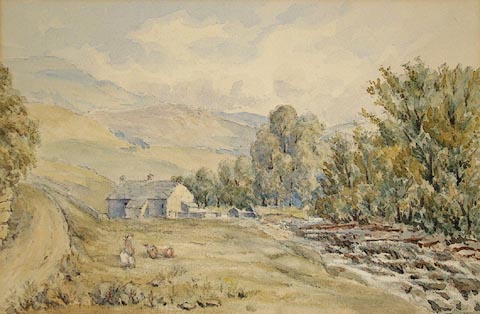 click to enlarge
click to enlargePR1023.jpg
A shallow rocky river flows to right of composition beside a wood to left of which, on a patch of flat grassland, a solitary female figure pauses beside a cow. A small farmhouse stands in middle distance. The road to left of composition rises towards the distant moors beyond.
item:- Tullie House Museum : 1968.61.1
Image © Tullie House Museum
item:- sheep
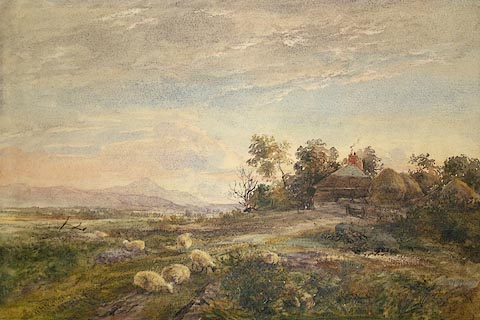 click to enlarge
click to enlargePR0800.jpg
Autumn scene of sheep grazing on and beside the track leading to a low farmhouse sheltered by a stand of trees to right of composition. Beside it stand several pointed haystacks. To the left of the track there lies a wide expanse of open farmland beyond which lie distant hills and mountains. The sky is filled with light pastel coloured sunset clouds.
signed &dated at bottom left:- "W H Nutter 1863"
item:- Tullie House Museum : 1895.53
Image © Tullie House Museum
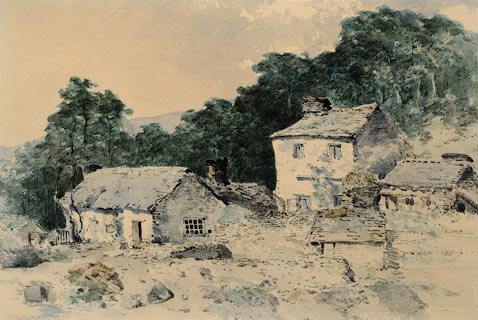 click to enlarge
click to enlargePR0942.jpg
Beyond stony grey foreground stand two whitewashed cottages and their outhouses; one is single storey, the other has an upper floor. Behind them rises a wooded hillside.
item:- Tullie House Museum : 1946.67.10
Image © Tullie House Museum
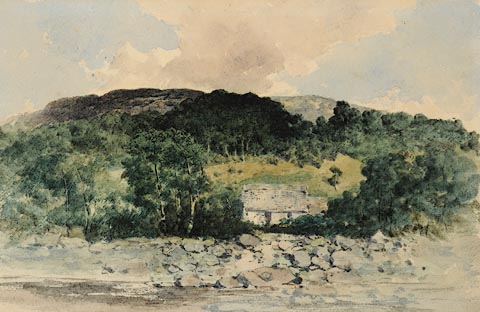 click to enlarge
click to enlargePR0950.jpg
Beyond foreground of water and rocky shoreline a small cottage nestles at the base of a wooded hillside; barren fells rise beyond.
item:- Tullie House Museum : 1946.67.19
Image © Tullie House Museum
item:- fishing
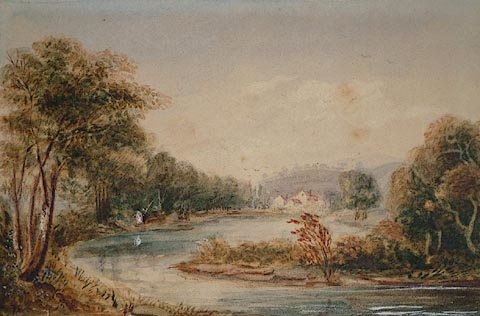 click to enlarge
click to enlargePR1042.jpg
In middle distance a couple walk beside a winding river flanked on both banks by autumnal trees; he carries a fishing rod over his shoulder. A distant farmhouse stands in centre of composition; hills rise beyond.
item:- Tullie House Museum : 1970.33.28.1
Image © Tullie House Museum
item:- pig; donkey; cart; street lamp
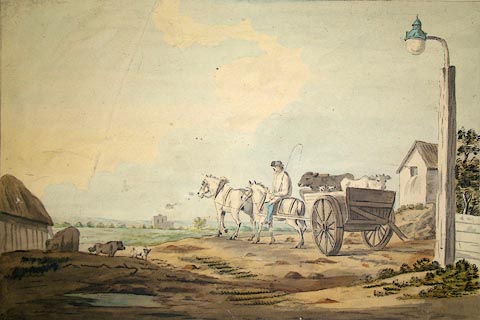 click to enlarge
click to enlargePR1032.jpg
In the foreground, beside a lampost, an agricultural worker wearing a smock sits astride one of the two ponies pulling his cart in which stand a donkey, a cow and two calves?. He looks over towards a thatched pigsty to extreme left of composition outside which stand a pig and two boars. To right of composition stands a barn. In the distance, beyond a military looking building, lie distant hills beneath a blue sky.
A farmer going to market?
item:- Tullie House Museum : 1970.33.9
Image © Tullie House Museum
item:- cattle; snow; volcano
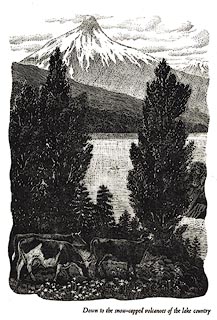 click to enlarge
click to enlargePR0661.jpg
On page 107 of Going Fishing, by Wesley Parson; a somewhat fanciful title!
printed at bottom right:- "Down to the snow-capped volcanoes of the lake country"
item:- Dove Cottage : 2008.107.602
Image © see bottom of page
item:- pele tower
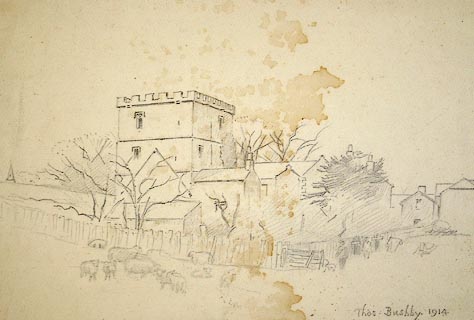 click to enlarge
click to enlargePR1334.jpg
In the foreground a farmer and his dog leave a fenced field in which a small flock of sheep and lambs is gathered. Beyond, in centre of composition, stands a farm and its outbuildings beside which a pele tower stands. Wintry trees grow inside the fence. A distant church spire is glimpsed to far left of composition and houses to far right.
dated at bottom left:- "Mar 21 1914"
signed &dated at bottom right:- "Thos; Bushby 1914"
item:- Tullie House Museum : 1996.252.18
Image © Tullie House Museum
item:- stile; stepping stones
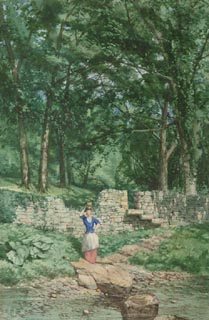 click to enlarge
click to enlargePR1309.jpg
Single figure in landscape; a young woman approaches the edge of a shallow rocky river flowing horizontally across lower plane of composition, a pail balanced on her head. Behind her stands a drystone wall with inbuilt stile over which she has climbed. Thick woodland lies beyond.
inscribed & signed &dated at bottom left:- "The way through the Wood Wm J Fairlie /55"
item:- Tullie House Museum : 1981.29
Image © Tullie House Museum
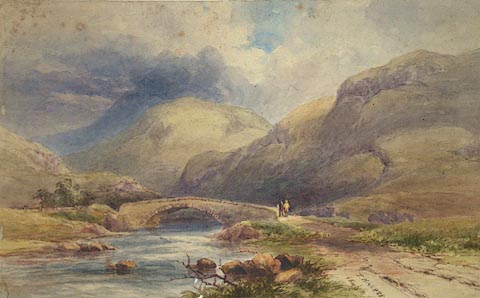 click to enlarge
click to enlargePR1044.jpg
Two figures approach a bridge in centre of composition which spans a shallow river. Beyond rise barren fells, the summit of the highest obscured by low cloud.
dated &signed at bottom right:- "1846 T HARPER"
inscribed at reverse:- "[ ton] by Harper"
item:- Tullie House Museum : 1970.33.28.4
Image © Tullie House Museum
item:- sunset
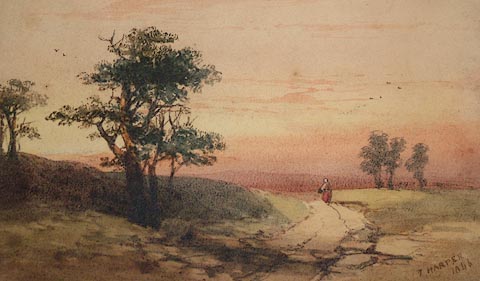 click to enlarge
click to enlargePR1043.jpg
Sunset scene; to left of foreground a tall tree casts a lengthy shadow across the track it stands beside. To right, the solitary figure of a woman carrying a basket over her left arm, her back to the viewer, approaches brow of hill. Distant hills lie beyond.
signed &dated at bottom right:- "T HARPER 1846"
item:- Tullie House Museum : 1970.33.28.2
Image © Tullie House Museum
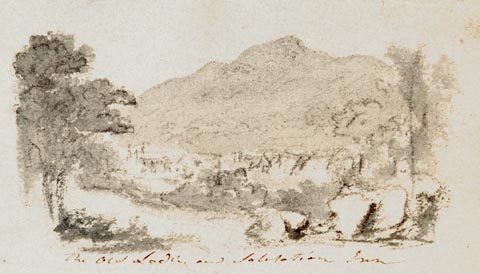 click to enlarge
click to enlargePR1391.jpg
View of the Old Lodor and Salutation Inn framed by trees with Lake District hills in the background. One of a set of twenty views of the lake district executed by the artist on one sheet of paper.
at bottom:- "The Old Lodor and Salutation Inn"
item:- Tullie House Museum : 2009.89.35
Image © Tullie House Museum
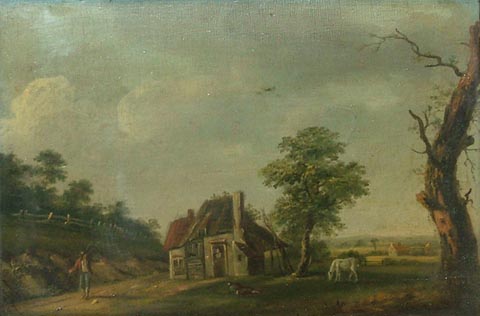 click to enlarge
click to enlargePR1287.jpg
Summertime; a man wearing the dress of an agrigultural worker waves goodbye to a woman standing in the doorway of a tiny ramshackle house in centre of composition. A second man lies in front of the building, a horse grazing nearby. To extreme right of composition stands a gnarled oak tree; between the tree and the house the rolling landscape unfolds in the distance.
item:- Tullie House Museum : 1978.108.147
Image © Tullie House Museum
